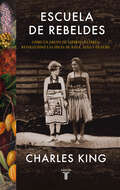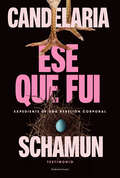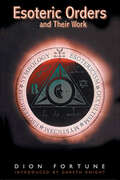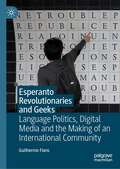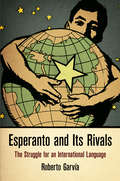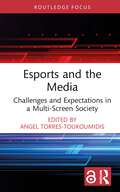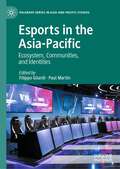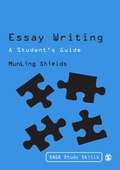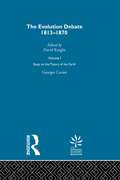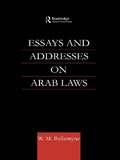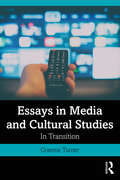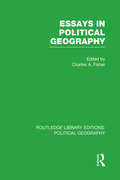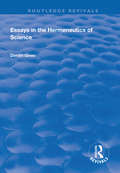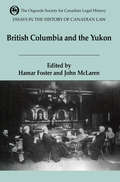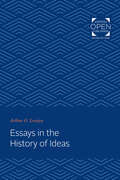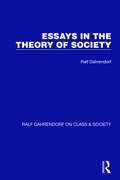- Table View
- List View
Escuchar(nos): Hacia la comprensión de los demás y de uno mismo
by Marina Castañeda¿En qué consiste escuchar a alguien? ¿Por qué, a lo largo de la historia, han existido grupos que "no merecen" ser escuchados y cuáles han sido las consecuencias para ellos? ¿Qué ha sucedido con el arte de la conversación? ¿Y con el silencio? Se dice que hay personas dotadas para la escucha, que nacieron con los dones de la empatía y la paciencia. Pero, ¿cómo consiguen estas personas eliminar los obstáculos, conscientes e inconscientes, individuales e interpersonales, sociales y culturales, que impiden que podamos escucharnos? Marina Castañeda analiza las dinámicas psicológicas profundas y, en su mayor parte, inconscientes, de la escucha, así como las relaciones de poder, las reglas de intercambio, los patrones culturales, y aspectos sociales y económicos que la rigen. Aborda el tema de la atención y explica cómo y por qué escuchamos lo que queremos. Recurre a la historia para mostrar por qué se está perdiendo esta vital facultad humana, y dar ejemplos de la escucha ideal; asimismo, expone las expectativas e ilusiones provocadas por la comunicación instantánea y el ciberespacio, así como los retos que plantea la globalización y la necesidad de inventar una nueva ética de la escucha. Además, gracias a su experiencia en este campo, la autora expone las características de la escucha en la psicoterapia, profesión que desde sus inicios ha estudiado el tema y desarrollado técnicas especializadas para lograr una escucha empática y respetuosa, al servicio del otro. Escuchar(nos) invita al lector a reflexionar sobre su capacidad de escuchar con una sección de preguntas y ofrece sugerencias para cultivar este arte y volver, nuevamente, el rostro hacia los demás.
Escudo Americano: El sargento inmigrante que defendió la democracia
by Susan Shapiro Aquilino Gonell&“American Shield&” es una historia típicamente americano sobre el deber y la determinación — maravillosamente contada por un inmigrante, un veterano de guerra, y un patriota.&”Nancy Pelosi, Speaker Emerita de la House of Representatives de los Estados UnidosAquilino Gonell era un jóven cuando llegó a los Estados Unidos de la República Dominicana. Aunque no hablaba inglés, se dedicó a su nueva tierra adoptada, luchando para conseguir el dichoso sueño americano. Su resolución de lograr una vida de éxito le llevó a alistarse en el ejército, como manera de pagar sus estudios universitarios. Tras combatir en Irak, volvió a los EEUU con TEPT, pero siguió con confianza en las promesas del gobierno, y se concentró en su familia y en el proceso de sanarse. Sus labores dieron fruto cuando ganó un puesto muy codiciado con la United States Capitol Police, en la ciudad de Washington DC, y llegó al rango de sargento.Todo cambió para siempre el 6 de enero de 2021. Cuando los insurreccionistas irrumpieron en el Capitolio, con mucha valentía el sargento Gonell no se rindió a los que intentaron frustrar la transferencia pacífica de poder. Las heridas brutales que sufrió aquel día pondría fin a su carrera como agente de policía. Pero justo cuando algunos de los mismos políticos que el sargento defendía intentaron desmentir la verdadera historia de aquel día, él eligió denunciar la injusticia que sufría al igual que el país. Una crónica de lo que significa llevar una vida de principios, una que se adhiere a las mejores nociones de nuestra democracia, American Shield es un testimonio fulgurante del poder la verdad, la justicia y la responsabilidad de la boca de un oficial decorado e inmigrante que ilustra las mejores aspiraciones de una nación agradecida.
Escuela de rebeldes: Cómo un grupo de espíritus libres revolucionó las ideas de raza, sexo y género
by Charles KingLA GRAN AVENTURA DE LOS ANTROPÓLOGOS QUE DESCUBRIERON QUE EL MUNDO SE EQUIVOCABA. «Que las ideas de Boas resultaran radicales y chocantes habla mal de su época; que el libro de King resulte hoy tan oportuno habla mal de la nuestra».The London Review of Books «Magistral. Esta historia es vital para nuestro tiempo».IBRAM X. KENDI La historia de un grupo audaz e inconformista que desmontó los mecanismos del racismo. A inicios del siglo XX las tesis eugenésicas, que defendían la superioridad del hombre blanco, alcanzaban su cénit. El mundo se fragmentaba, un nuevo modelo imperialista entraba en acción y la antropología cultural, una ciencia aún desconocida pero en auge, auspiciaba la división colonizadora. Fue entonces cuando Franz Boas y su círculo de estudiantes, esencialmente mujeres -entre ellas las brillantes Margaret Mead, Ruth Benedict, Ella Deloria y Zora Neale Hurston-, se rebelaron contra el canon imperante, aportaron una base sólida a lo que hoy llamamos «relativismo cultural» y dieron lugar a la antropología moderna. Desde el terreno académico y aplicando el método científico, demostraron que ninguna civilización es superior a otra y que, independientemente de las diferencias en el color de la piel, los hábitos sexuales o las costumbres, la humanidad es una e indivisible. Escuela de rebeldes recorre las vidas de estos hombres y mujeres pioneros, repletas de escándalos, romances, rivalidades y tragedias. En sus viajes -al círculo polar ártico, a las reservas americanas de las grandes llanuras, al Pacífico Sur o al Caribe…- documentaron enfoques radicalmente diferentes sobre el amor, la crianza, la familia y la relación entre hombres y mujeres. Armados de pruebas, aportaron una llave maestra para entender el mundo y la humanidad. Juntos estuvieron «en la primera línea de la batalla moral más importante de nuestro tiempo», y resultaron vencedores. La crítica ha dicho:«Simplemente magnífico, y en muchos sentidos profundamente conmovedor. La prosa de King, increíblemente amena y brillante, es ideal para contar una de las historias más fascinantes del siglo XX».All About History «Hoy más que nunca necesitamos entender la visión alternativa de la humanidad que desarrollaron Boas y sus discípulas».Financial Times «Elegante y caleidoscópico. Este es el momento perfecto para un libro tan humano».The New York Times «Enormemente revelador y adictivo».The Sunday Times «Nadie había contado la historia del ascenso de la antropología a su estatus de llave maestra, y King lo hace con sutileza y garbo. Un relato convincente sobre los precursores intelectuales del multiculturalismo».History Today «La noción de relativismo cultural fue un descubrimiento tan extraordinario en su campo como el de la teoría de la relatividad en el de la física, una revolución de la mente europea. Este libro excepcional explica por qué».Wade Davis «King pone en el centro de la escena a Mead y a sus compañeros de viaje, que fueron pioneros en un campo nuevo, documentaron la diversidad de la humanidad con todos sus matices y con un enfoque positivo, en lugar de divisivo».USA Today
Ese que fui: Expediente de una rebelión corporal
by Candelaria SchamunEn este testimonio íntimo y mordaz puede leerse la fractura de una época que discriminó, torturó y mutiló a las personas nacidas con alguna ambigüedad genital o con características intersex, que no encajaban en el binomio Mujer/Varón. La búsqueda del pasado oculto -con su cáustico señalamiento a los mandatos sociales sobre el cuerpo, el género y el sexo- entraña una mirada compasiva y tierna que permite la reconciliación de una mujer no solo con su pasado, también con su madre. «Si me expongo, es para dejar testimonio del daño irreparable e irreversible que hizo la medicina sobre mi cuerpo. Y es, entre otras razones, para exigir que dejen de mutilar a niños y niñas en nombre de la normalidad médica». Decidida a saber la verdad, la protagonista de Ese que fui se enfrenta con la familia y consigo misma. El rompecabezas hecho de silencios, recuerdos fragmentarios, síntomas físicos, dolores atroces y culpas incomprensibles empieza a encajar cuando por casualidad encuentra una carpeta con su nombre en el fondo de un cajón. Impactada por lo que esos papeles insinúan, escapa de su casa. Pero, como toda fuga, esta es también circular: apenas su madre manifieste los primeros indicios de estar perdiendo la memoria, querrá preguntarle lo que hasta entonces no pudo. Candelaria Schamun, quien trabajó por años como cronista de policiales, inicia una pesquisa en tiempo real que la tiene por presunta víctima. ¿Cuál es el fantasma que la habita? Reclamará legajos en los juzgados; revisará historias clínicas; entrevistará a médicos, parientes, exparejas, activistas y personas con experiencias similares, para denunciar el borramiento del que ha sido objeto. La crítica dijo: «Este libro es muchos libros: una investigación autobiográfica, la denuncia sobre los mecanismos crueles y la moral conservadora de la medicina, una novela apasionante sobre un secreto familiar. Pero sobre todo es la narración conmovedora del encuentro con la verdadera identidad. Pocas veces me emocioné tanto».Luciano Lamberti
Esoteric Mysteries of the Underworld: The Power and Meaning of Subterranean Sacred Spaces
by Jean-Pierre BayardA comprehensive guide to the ancient beliefs and spiritual power of subterranean spaces • Examines in depth the myths, symbology, deities, and beliefs connected to the underworld from many different cultures and mystery traditions • Investigates the role of the underworld in initiatory rites and mystical practices, such as the Orphic Mysteries, the chambers of reflections in Freemasonry, the cult of the Black Madonna, and the cult of Isis • Discusses the telluric currents that run through ley lines, the significance of underground waterways, Hollow Earth theory, and the denizens of the subterranean realms, such as dragons, gnomes, and dwarfs Ancient cultures around the world understood the spiritual powers of the underworld. For millennia, natural caves and caverns were turned into sacred underground temples and, from holy mountains and cliffs, churches were beautifully carved into solid rock. Offering a guide to the spiritual energies that flourish beneath the surface of the Earth, Jean-Pierre Bayard explores the esoteric mysteries of the underworld, including the symbolic significance of caves, caverns, and underground temples. He examines in depth the myths, symbology, deities, and beliefs connected to the underworld from many different cultures and mystery traditions, from ancient Egypt to Scandinavia and Europe to the Middle East and India. He investigates the role of the underworld in initiatory rites, such as the Orphic Mysteries and Christ&’s descent into hell, revealing that at the heart of these teachings is the transformative power of a hero&’s descent into and return from the underworld. The author connects the esoteric attributes of the world below with the cult of the Black Madonna and the earlier cult of Isis. He discusses the telluric currents that run through ley lines, the significance of underground waterways, the esoteric properties of gems and stones, and the &“mineral blood&” of the alchemists. He also looks at Hollow Earth theory and the denizens of the subterranean realms, such as dragons, gnomes, and dwarfs. Explaining how the Earth is the womb of the world, Bayard shows how initiatic descent into the sacred subterranean realms reflects the descent of spirit into matter and its slow crystallization. By entering the body of the Earth Mother we are transformed, initiated into primordial wisdom and reborn as spiritual beings.
Esoteric Orders and Their Work
by Dion FortuneFrom the British occultist and author, a classic study of what esoteric orders are and what they can offer initiates.People have been interested in secret traditions since the beginning of time. Fraternal brotherhoods and sisterhoods, and secret orders of varying degrees exist in every country, race, and religion.In Esoteric Orders and Their Work, author Dion Fortune gets to the root of exactly what esoteric orders are, leaving no stone unturned. The chapter “Esotericism, Occultism, and Mysticism” defines what esotericism is in relation to exotericism—in layman’s terms, the inner life versus the outer one. In “The Origin of the Mysteries,” she looks at how esotericism grew hand-in-hand with the evolution of humankind, discussing how humans evolved from a group soul (still present in animals today, i.e.: packs of wolves) into a singular soul. “The Paths of the Western Tradition” is a discussion on the different schools that have developed (known as Rays) and how students, after having formed a solid base of knowledge, work through each ray on their way to becoming closer to an esoteric ideal. She expounds upon Masters in “The Evolution and Functions of the Masters.” We discover that they are not so much superhuman entities as beings who have learned all they need to know on the physical plane and now teach from the ethereal. Chapters such as “The Right and Left-Hand Paths” and “The Use and Power of Ritual” explain the differences between Black and White Occultism, and how long-kept-secret rituals taught only to initiates are used to further the order’s members along their paths.Today, in the centers of the civilized world, there is renewed interest in esoteric schools, and although they may be misunderstood by the mainstream, some of the noblest people have been among their advocates. This book removes the shroud of mystery and fear from esotericism and makes the Western Mystery Tradition accessible to anyone who has ever been curious about this fascinating spiritual path!Revised edition contains a new foreword by Gareth Knight, and an index.
Espanol medico y sociedad: Un libro para estudiantes de espanol en el tercer ano de estudios (Revised Edition)
by Alicia GiraltEspanol medico y sociedad/ Medical Spanish and Society is an innovative textbook that fulfills the needs of upper-division Spanish students who are pursuing degrees in the health professions, plan to become medical interpreters or just want to improve their proficiency in the language. It provides multiple opportunities to learn vocabulary related to the medical field, reviews hard-to-understand grammatical concepts, describes health-related cultural competence and presents opportunities to discuss issues of concern about the health of Hispanic communities in the US and abroad.
España contra pronóstico: De cómo conquistamos nuestras libertades y del cuidado que requieren
by Aguilar, Miguel ÁngelUn libro lleno de verdad que repasa cada una de las señas de identidad de España, la economía y la clase política. Necesario y de actualidad. «Las reflexiones aquí recogidas parten de la fragilidad de la democracia. Sostienen la reversibilidad de sus logros. Salen al paso del entusiasmo que entre nosotros provocan los desastres. Alertan contra el regreso al cainismo de las dos Españas. Se dirigen a esa tercera España, la de los transterrados. Pero acusan, sin duda, su procedencia; la de un periodista con deberes de urgencia. Cumplen con el deber de molestar. Consideran que preguntar no ofende. Distinguen entre el principio de causalidad y el de contigüidad. Permiten deducir el coste de la no España».MIGUEL ÁNGEL AGUILAR El periodista Miguel Ángel Aguilar, colaborador habitual en diversos medios nacionales, examina con la lucidez que no empaña la pasión las instituciones de hoja perenne de la sociedad española desde elfinal del franquismo, los logros de la democracia y la situación actual. Y repasa con estilo periodístico irónico y certero la actualidad que tergiversa la realidad, la Constitución, la monarquía, las Fuerzas Armadas, la Iglesia, los partidos políticos, la respuesta de los ciudadanos en la calle, la justicia, el estado del bienestar o Europa, entre otras cuestiones fundamentales. España contra pronóstico es un libro lleno de verdad, irónico, necesario, que incentiva la reflexión sobre algunas de las señas de identidad de nuestro país y sirve al autor de exorcismo liberador.
España en serie. Cada serie cuenta una historia y todas juntas cuentan nuestra historia
by Álex MendíbilUn viaje a través del tiempo, la realidad y la ficción. Todas las series cuentan una historia y todas juntas cuentan nuestra historia. España en serie parte de un trabajo documental minucioso elaborado por Canal + durante un año y medio de producción, con más de 90 entrevistas a algunas de las actrices, actores, guionistas, directores y productores de televisión más importantes de las últimas décadas. Este libro reconstruye y amplía ese valioso material, que acapara los principales acontecimientos históricos y sociales de la ficción televisiva española, por y para los amantes de las series. La historia de España se cuenta a lo largo de estas páginas desde una nueva óptica, con un peculiar orden cronológico que empieza en Hispania para llegar a las series del futuro como Plutón BRB Nero, permitiendo así un análisis horizontal de cada época. Críticas de televisión, testimonios de los artistas, de los profesionales y un poderoso material gráfico completan un estudio pormenorizado y exquisito. De forma simultánea se alza en España en serie una visión sociológica ya que la interpretación de los acontecimientos varía en función de la década y de la situación del país. ¿Cómo se veía la España de los Reyes Católicos en los años del destape o de la movida y cómo se ve ahora con Isabel? ¿Cómo eran los personajes de las series de la Transición y cómo los ve Cuéntame? Gracias al oficio y a la prosa de Álex Mendíbil la lectura de este libro se convierte en una gratificante experiencia, en un recuerdo de los mejores momentos vividos enfrente del televisor. Un recorrido por más de 50 años de historia de la televisión y 23 siglos de historia de España, un viaje a través del tiempo, la realidad y la ficción. Los protagonistas han dicho... «La que llega a todos: esa es la serie buena». Antonio Resines «La teleme llevó a dedicarme a ser actriz». Carmen Machi «La ficción llegó para quedarse y se va a quedar. El público demanda cosas con las que se sienta identificado». Emilio Aragón «Hay momentos de éxtasis en la tele». Javier Cámara «Tenemos necesidad de conocer nuestra propia Historia». Josefina Molina «El espectador, finalmente, lo que tiene que hacer es conmoverse con lo que aparece por la tele». Juan Echanove «Somos la última generación que empezamos en blanco y negro. Y cuando desaparezcamos, ya sólo quedarán los archivos». José Sancho «Yo un día abrí El País y ponía que los tres personajes más populares de España eran Letizia Ortiz, Fernando Alonso y Fernando Tejero y a mí aquello me horrorizó». Fernando Tejero «España en serie cuenta la historia de un país a través de una nueva óptica y con un peculiar orden cronológico». El Siglo de Europa Reseñas: «Sobre emociones e historia, aunque contemporánea, gira el volumen de España en serie, escrito por Álex Mendíbil con motivo del programa del mismo título emitido recientemente por Canal + y en el que se recoge el archivo de la memoria para contar la historia de España en series». Diario de Noticias
Esperanto Revolutionaries and Geeks: Language Politics, Digital Media and the Making of an International Community
by Guilherme FiansThis book explores how Esperanto – often regarded as a future-oriented utopian project that ended up confined to the past – persists in the present. Constructed in the late nineteenth century to promote global linguistic understanding, this language was historically linked to anarchism, communism and pacifism. Yet, what political relevance does Esperanto retain in the present? What impacts have emerging communication technologies had on the dynamics of this speech community? Unpacking how Esperanto speakers are everywhere, but concentrated nowhere, the author argues that digital media have provided tools for people to (re)politicise acts of communication, produce horizontal learning spaces and, ultimately, build an international community. As Esperanto speakers question the post-political consensus about communication rights, this language becomes an ally of activism for open-source software and global social justice. This book will be of relevance to students and scholars researching political activism, language use and community-building, as well as anyone with an interest in digital media more broadly.
Esperanto and Its Rivals
by Roberto GarvíaThe problems of international communication and linguistic rights are recurring debates in the present-day age of globalization. But the debate truly began over a hundred years ago, when the increasingly interconnected world of the nineteenth century fostered a desire for the development of a global lingua franca. Many individuals and social movements competed to create an artificial language unencumbered by the political rivalries that accompanied English, German, and French. Organizations including the American Philosophical Society, the International Association of Academies, the International Peace Bureau, the Comintern, and the League of Nations intervened in the debate about the possibility of an artificial language, but of the numerous tongues created before World War II, only Esperanto survives today.Esperanto and Its Rivals sheds light on the factors that led almost all artificial languages to fail and helped English to prevail as the global tongue of the twenty-first century. Exploring the social and political contexts of the three most prominent artificial languages--Volapük, Esperanto, and Ido--Roberto Garvía examines the roles played by social movement leaders and inventors, the strategies different organizations used to lobby for each language, and other early decisions that shaped how those languages spread and evolved. Through the rise and fall of these artificial languages, Esperanto and Its Rivals reveals the intellectual dilemmas and political anxieties that troubled the globalizing world at the turn of the twentieth century.
Esperanza Speaks: Confronting a Century of Global Change in Rural Panama (Teaching Culture: UTP Ethnographies for the Classroom)
by Gloria RudolfEsperanza Speaks examines a century-long process of socioeconomic change in rural Panama through the experiences of one woman, Esperanza Ruiz, and four generations of her family. The intimate narrative shows how ordinary people, through their choices and actions, are affected by and, in turn, can affect how history unfolds. Readers see Esperanza’s family as both victims and protagonists in their own histories. Born into rural poverty with limited options, they still find small openings to try to improve their lives. Sometimes successful, sometimes not, they survive by drawing on their only abundant resource: each other. Based on twenty field visits over the course of fifty years, Esperanza Speaks is the result of a dedicated anthropologist’s long-term engagement with the individuals of a single community, and a beautiful example of ethnographic storytelling.
Esports and the Media: Challenges and Expectations in a Multi-Screen Society (Routledge Focus on Digital Media and Culture)
by Angel Torres-ToukoumidisThis book takes a multidisciplinary approach to the question of esports and their role in society. A diverse group of authors tackle the impact of esports and the ways in which it has grown within the entertainment industry around the world.Chapters offer a coherent response to the following questions: What role do esports play in the entertainment industry? What communication skills can be learned through esports? What do the media gain from broadcasting esports? What is the relationship between social networks and esports? What are the main marketing strategies used in esports? What effect does communicative globalization have on the development of esports? What is the relationship between merchandising and esports? What do communication experts think about esports? Offering clear insights into this rapidly developing area, this volume will be of great interest to scholars, students, and anyone working in game studies, new media, leisure, sport studies, communication studies, transmedia literacy, and digital culture.The Open Access version of this book has been made available under a Creative Commons Attribution-Non Commercial-No Derivatives 4.0 license: https://www.taylorfrancis.com/books/oa-edit/10.4324/9781003273691/esports-media-angel-torres-toukoumidis
Esports in the Asia-Pacific: Ecosystem, Communities, and Identities (Palgrave Series in Asia and Pacific Studies)
by Paul Martin Filippo GilardiThis is an edited book that fills a gap in knowledge by providing a comprehensive view of esports practice from the Asia and Pacific region. The volume looks at the development of esports through the interconnections between institutions, industries, players, and society, across the Asia-Pacific. Over the last two decades, the Asia-Pacific region has been central to the growth and development of esports. The value of this book lies in its ability to provide a view of esport from countries that are currently underrepresented in the literature such as Vietnam, Malaysia, Taiwan, Hong Kong, Singapore, Philippines and Australia while still integrating chapters looking at more well-researched countries such as China, Korea, and Japan. Through its diverse case studies, the book serves as a resource for scholars and educators worldwide who seek diverse examples with which to improve understanding of the esports phenomenon and the inclusiveness of media and communication curricula. chapters “Introduction to Esports in the Asia-Pacific” and “Conclusions to Esports in the Asia–Pacific” are available open access under a Creative Commons Attribution 4.0 International License via link.springer.com.
Essay Writing: A Student's Guide (SAGE Study Skills Series)
by Munling Shields'An excellent guide for students new to writing essays at university' David Ellicott, Senior Lecturer in Youth Justice and Youth Studies, Nottingham Trent University Essay Writing is a student guide with a mission: to enable students to write better essays and get the grades they deserve by demystifying the essay-writing process. MunLing Shields places essay writing within the larger university experience for students. In a clear and easy to understand way the author guides the reader through the process of writing successful university essays by looking at essay writing in the context of academic communication, academic culture and different learning styles and approaches. This book helps students to study more independently and learn more meaningfully to write better essays. Essay Writing also offers invaluable insights into the way tutors see essays, explaining why essays are set, how to understand the rationale behind them, and demonstrating how best to approach answering the question. This highly accessible book offers practical, in-depth guidance on each of the stages of the essay writing process - planning, drafting and editing - and relates them to the important sub-skills of information-gathering, reading academic texts, how to get the most out of lectures, referencing and citations, and fluency and appropriateness of style and language.
Essay on the Theory of the Earth, 1813
by Georges CuvierBased at the Parisian Museum of Natural History, Cuvier was able to compare the fossil bones he dug from the quarries of Montmartre with those of animals alive today. Guided by the principle of correlation, that all the parts of an animal must cohere, and by analogy, with living species, Cuvier boldly reconstructed extinct creatures from the incomplete skeletons he unearthed. This process is described in his Essay on the Theory of the Earth.
Essays and Addresses on Arab Laws
by W. M. BallantyneGathering together the author’s earlier writings along with essays on recent developments, this text provides essential information for anyone wishing to do business in Arab countries and needing to acquaint themselves with the legal position there. The volume presents an impartial examination of the commercial laws of the Gulf Arab states and gives details of how pitfalls and costly errors can be avoided when dealing with those states. Based on the author's extensive professional experience, the book is indispensable to business men contemplating doing business in the Arab world, and to students of Arab commercial life.
Essays in Media and Cultural Studies: In Transition
by Graeme TurnerSpanning a decade of key research, this collection brings together a selection of essays and chapters from leading media scholar Graeme Turner for the first time. The organising theme of transition focuses on both the state of the media as it continues its evolution into the digital era, and the fields of media and cultural studies as they grapple with modifying their approaches and assumptions in response to the changing dynamics of the systems they study. In their own attempts to understand a range of contemporary moments over the decade, these essays also provide a personal history of Graeme Turner’s participation in the key debates within media and cultural studies. The essays deal with the shifting states of television, with the changing relation between the media and the state, the rise of celebrity, and the role of a critical agenda for media and cultural studies in the future. The collection is introduced and concluded by two new essays, respectively assessing the recent past and the necessary futures for these fields of study. Providing key insights into a range of topics, this book is ideal for students and scholars looking to deepen their understanding of the transitionary nature of media and cultural studies.
Essays in Ottoman and Turkish History, 1774-1923: The Impact of the West
by Roderic H. DavisonThe effect of Western influence on the later Ottoman Empire and on the development of the modern Turkish nation-state links these twelve essays by a prominent American scholar. Roderic Davison draws from his extensive knowledge of Western diplomatic history and Turkish history to describe a period in which the actions of the Great Powers, incipient and rising nationalisms, and Westernizing reforms shaped the destiny of the Ottoman Empire and the creation of the new Turkish Republic. Eleven of the essays were previously published in widely scattered journals and multi-authored volumes. The first of these provides a general survey of Turkish and Ottoman history, from early Turkish times to the end of the Empire. The following essays continue chronologically from 1774, detailing some of the changes in the nineteenth-century Empire. Several themes recur. One is the impact of Western ideas and institutions and the resistance to that influence by some elements in the Empire. Another concerns the diplomatic pressure exerted by the Great Powers of Europe on the Empire, which amounted at times to direct intervention in Ottoman domestic affairs. Taken together, the essays portray a confluence of civilizations as well as a clash of cultures. Professor Davison has written an interpretive introduction that sets out the historical trends running throughout the book. In addition, he includes a previously unpublished article on the advent of the electric telegraph in the Ottoman Empire to show how the adoption of a Western technological advance could affect many areas of life. Of particular interest to students of Ottoman and Middle East history, these essays will also be valuable for everyone concerned with modernization in developing nations. Davison's interpretations and keen methodological sense also shed new light on several aspects of European diplomatic history.
Essays in Political Geography (Routledge Library Editions: Political Geography)
by Charles A. FisherThis volume, originally published in 1968, is in two parts. The first covers various geographical aspects of the internal structure and the external relationships of states and introduces some of the concepts which are examined in specific regional context in the case studies in Part 2.
Essays in the Hermeneutics of Science (Routledge Revivals)
by Dimitri GinevPublished in 1997, this volume is written from a hermenutico-phenomenological point of view. The essays cover a spectrum of relevant issues: the essential interpretation of science; the possibility of a "strong hermeneutics of science" that takes into consideration science's cognitive structure; the implications of existential-ontological interpretations of science for the post-metaphysical dialogue between hermeneutics and epistomology; the place of rhetorical tools in the human sciences; and the strategies of overcoming the legitimation crisis of the human sciences. Because of its commitment to the radical universalization of the hermeneutic problem, the strong programme of hermeneutics of science, suggested in this book, avoids both objectivism and relativism. In this regard, the essays must be read in relation to the search for a middle way between defending epistemic rationality as a basis for futher development of the "project of modernity" and the postmodern deconstruction of all cognitive identities of modernity.
Essays in the History of Canadian Law Volume VI
by John Mclaren Hamar FosterThis sixth volume in the Osgoode Society's distinguished series on the history of Canadian law turns to the a central theme in the history of British Columbia and the Yukon - law and order. In the early days of British sovereignty, the frenzied activity of the fur trade and the gold rush, along with clashes between settlers and Natives, made law enforcement a difficult business. Later, although law and order were more firmly established, tensions continued between the dominant populations committed to the practice and rhetoric of British justice and those groups owing allegiance to other value systems (such as Native peoples, Asian immigrants, and Doukhobors) or those resisting authority (criminals and the criminally insane). These essays look at key social, economic, and political issues of the times and show how they influenced the developing legal system.The essays cover a wide range of topics, and explore the human as well as the legal dimensions of their subjects, relating specific cases to broader theory. They demonstrate that English law has been flexible enough to accommodate diversity and is, therefore, pragmatic. The volume also proves that there is no single Canadian legal culture: geography, demography, politics, economics, and military considerations have had an impact on the shape of our legal culture. The introduction by John McLaren and Hamar Foster pulls together the many regional themes to provide a clear overview of the legal complexities of the period.
Essays in the History of Ideas
by Arthur O. LovejoyOriginally published in 1948. In the first essay of this collection, Lovejoy reflects on the nature, methods, and difficulties of the historiography of ideas. He maps out recurring phenomena in the history of ideas, which the essays illustrate. One phenomenon is the presence and influence of the same presuppositions or other operative "ideas" in very diverse provinces of thought and in different periods. Another is the role of semantic transitions and confusions, of shifts and of ambiguities in the meanings of terms, in the history of thought and taste. A third phenomenon is the internal tensions or waverings in the mind of almost every individual writer—sometimes discernible even in a single writing or on a single page—arising from conflicting ideas or incongruous propensities of feeling or taste to which the writer is susceptible. These essays do not contribute to metaphysical and epistemological questions; they are primarily historical.
Essays in the Theory of Society (Ralf Dahrendorf on Class & Society #2)
by Ralf DahrendorfOriginally published in 1968, these ten essays by one of Europe’s leading sociological theorists deal with important issues on the borderline between sociology and social philosophy and demonstrate the author’s deep insight into history and political analysis. The author maintains that the structures of power in which the political process takes place not only originate change and give it direction, but also produce the fertile conflicts that give expression to the fundamental uncertainty of human existence. Through an examination of various concepts inherent in this dynamic process – power, resistance, conflict, change, freedom, uncertainty – a coherent theory of society emerges.
Essays of a Lifetime: Reformers, Nationalists, Subalterns (SUNY series in Hindu Studies)
by Sumit SarkarA distillation of the historian's finest writings on modern Indian historical themes.For the past forty years or more, the most influential, respected, and popular scholar of modern Indian history has been Sumit Sarkar. When his first monograph, The Swadeshi Movement in Bengal 1903–1908, appeared in 1973 it soon became obvious that the book represented a paradigm shift within its genre. As Dipesh Chakrabarty put it when the work was republished in 2010: "Very few monographs, if any, have ever rivalled the meticulous research and the thick description that characterized this book, or the lucidity of its exposition and the persuasive power of its overall argument."Ten years later, Sarkar published Modern India 1885–1947, a textbook for advanced students and teachers. Its synthesis and critique of everything significant that had been written about the period was seen as monumental, lucid, and the fashioning of a new way of looking at colonialism and nationalism.Sarkar, however, changed the face not only of modern Indian history monographs and textbooks, he also radically altered the capacity of the historical essay. As Beethoven stretched the sonata form beyond earlier conceivable limits, Sarkar can be said to have expanded the academic essay. In his hands, the shorter form becomes in miniature both monograph and textbook.The present collection, which reproduces many of Sarkar's finest writings, shows an intellectually scintillating, skeptical-Marxist mind at its sharpest.


